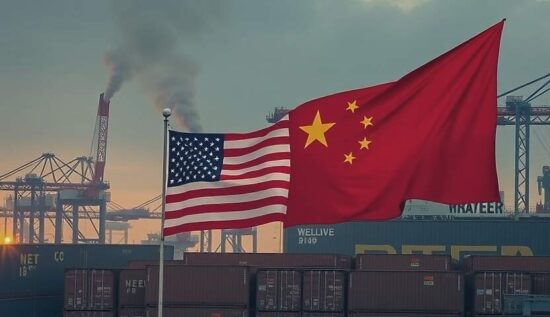A potential relapse in the trade war between China and the United States could be imminent if the two sides fail to resolve their differences before Chinese retaliatory tariffs on US exports take effect, according to the Financial Times, citing analysts.
US President Donald Trump signed an executive order in early February, imposing a 10% tariff on all Chinese imports and justifying the move as a means of combating the illegal drug trade, particularly fentanyl. The tariffs took effect three days later, on February 4. In response, China launched anti-monopoly investigations against Google and Nvidia and imposed 15% tariffs on US coal and liquefied gas, as well as 10% tariffs on US oil and agricultural machinery. The decision is set to take effect on February 10.
According to Zhang Yansheng, an expert at the China Center for International Economic Exchanges, “this could be just the beginning of the trade war phase” and if the situation does not change, it will lead to a “very, very bad situation.”
Some analysts had expected the US and China to engage in talks to avert a larger trade conflict. Trump said he would speak with Chinese President Xi Jinping, but after China’s retaliatory measures, he added that he was not in a hurry to call him. Experts in Beijing believe that the Republican’s attempt to get China to sign an agreement has had the opposite effect. Ma Wei, an analyst with the Chinese Association for American Studies, said, “China will not accept such an agreement. We must negotiate on an equal footing and sign a mutually beneficial agreement and not impose high tariffs on the other side and then demand an agreement.”
At the same time, experts say that China’s limited response suggests there is still room for negotiation.
John Gong, a professor at the University of International Business and Economics in Beijing, believes that the fentanyl problem is easy to resolve, as both sides are already working together on the issue. He speculated, “Trump will probably ask for something more that the Chinese authorities cannot publicly discuss.”
Concretely, the Republican might demand more on issues like Russia’s involvement in the Ukraine conflict or conditions for the sale of TikTok.
The trade expert Wendy Cutler is of the opinion that China, unlike Canada and Mexico, “will play for time”: “Beijing will likely adopt a wait-and-see approach before engaging in talks.”
Analysts note that China is now better prepared for the introduction of tariffs than last time and Beijing is more concerned about US controls on technology exports.
The US imported Chinese goods worth $401 billion in the first 11 months of 2024 and $448 billion in 2023. The US trade deficit with China in goods stood at around $270 billion in the period from January to November last year. The value of Chinese imports from the US that will be subject to China’s tariffs, according to Chinese customs statistics, is around $14 billion, which is 8.5% of the total value of US imports to China.





